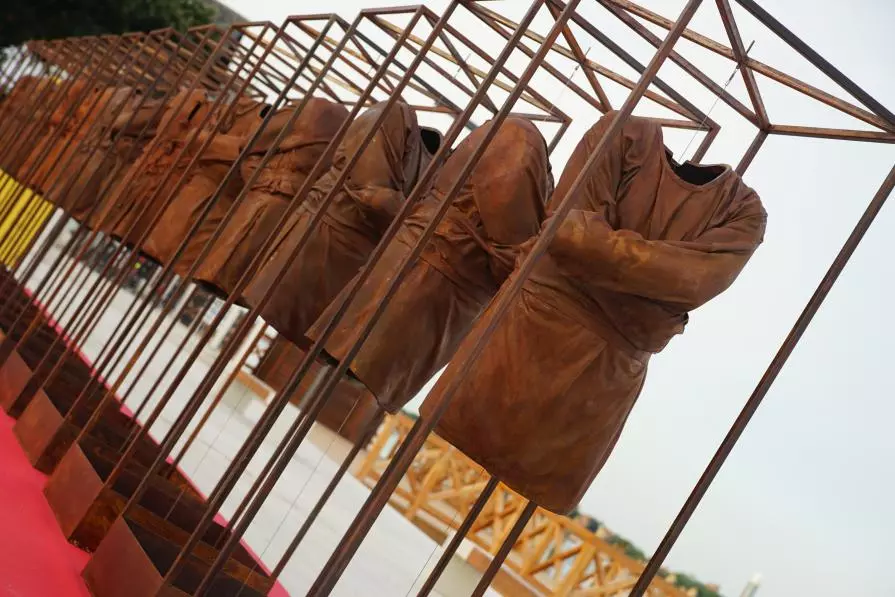THE SHIP OF FOOLS
body - part of her installations illustrate the paradox that the realization of reality can be stronger
and more powerful not in putting the objects on display, but in marking their absence. ‘Empty’
clothes tell stories that allude to various aspects of human existence - from the futility of parlor
protocols restricting the personality to certain frameworks imposed from outside to the rebellion
and revolution constrained in the of penalty regimes in human socium. Clothes can be
both original expression and personal prison for human individuality. According to Michel Foucault "the body is also immersed in a political field; power relationships take a direct grip on it; they
surround it, mark it, educate it, torture it, force it to work, impose on it various ceremonies, require of
it signs.”*** In this sense the ‘signs’ of the body left by Gonul Nuhoglu create a new interpretation of
the world we live in, personal belongings are not just belongings, but an emanation of the
disintegration of the personality at a time when personal moral imperatives can generally walk past
the messages sent by the political regimes.
The title of the art installation Ship of the fools points to a different perspective
considering contemporary social analysis as the subject of Gonul Nuhoglu’s research endeavours.
Here the matter in question is to what degree our self- imposed censorship influences our free
expression and if such an act is the product of our social environment, which is a precondition for us,
on an existential level, to restrict and synchronize all our thoughts and actions. Back in 1972 Erich
Fromm wrote that “whereas industrial society all over the world increases literacy, and eventually
higher education, its educational progress is in sharp contrast to the inability of citizens for active
critical thought. While on the one hand literacy increases, television creates a new type of illiteracy in
which the consumer is fed by pictures, using his eyes and ears but not his brain. Briefly, while we are
producing ever more efficient machines, man himself is losing some of his most important qualities”.
Erich Fromm predicts that the “passive consumption” will by all means destroy the social systems.
Today, 45 years later, Gonul Nuhoglu’s strait jackets, quietly hanging in the air bring back the
question if the world-renowned German social psychologist’s prediction is actually coming true in the
worldwide societies, which create all kinds of controversial messages, spoken in words, which are
losing their meaning more and more until they become shallow political clichés.
In many of Gonul Nuhoglu’s works, human presence is depicted only as a shadow, barely
there, or there is a hint of it through abandoned personal belongings, just scattered around which
provoke the question if the common human nature could be visually captured in the works of art
represented by a particular face or a body depicted through many artistic details. The artist poses
the question if our physical presence here on earth is meaningful enough, unless we are capable to
bring change to the present through our creative energies, which we lose eventually, focusing our
attention on the insignificant components of our existence. Thus, we gradually become members of
the Ship of the fools’ crew, floating in a tempestuous ocean, no captain on-board, without purpose or
hope to ever reach the shore.
 Share / Save
Share / Save



















Commenti 0
Inserisci commento